Can you be strict with me?
When we think of someone strict, we usually think of someone in authority, such as a parent, teacher, or even a boss. Some people have negative childhood memories of a parent who was not only strict but also abusive, whereas others have positive memories of a strict teacher who expected a lot from her/his students. Either way, we've all experienced someone strict.
But…
There's a big difference between someone who is strict and someone who can be strict.
Suppose we can picture a specific person who is strict. In that case, strict may be a trait because we've experienced her/him over a longer period, so strict is not only related to a particular episode but is also part of this person’s personality. However, strict is, in most cases, and certainly in my quest to find you, someone who can be strict, a state.
Strict as a state is situational and can be experienced as an energy that operates on a different frequency than your usual self. Being strict is, therefore, temporary, something you can be when necessary before you return to another state. In my experience, few people want to be strict with somebody unless the situation demands it. That's because it takes effort and can feel uncomfortable in the moment.
The quality and condition of being strict, strictness, can be associated with unpleasant feelings, which makes strictness not something to be desired but rather something to avert. Strictness is certainly not something we're supposed to want and far less something to actively seek out. Perhaps because strictness causes nervousness or discomfort and can evoke strong emotions, fear, and anxiety, resulting in mixed feelings about strictness altogether. I wish it were different because strictness can also be a positive experience, so here's another thought…
Strictness is a way to create tension. That tension can involve being on the hook. If someone’s on the hook, the person is responsible, obligated, accountable, or committed to something. If someone’s off the hook, the person is relieved of that pressure or can get away with something, and she/he is being released from something difficult. When I think about strictness as creating tension that puts someone on the hook, I think it's an essential quality worth exploring further because, for the most part, nobody wants to be on the hook. Yet, the most worthwhile and meaningful pursuits, discoveries, and breakthroughs happened when someone was on the hook.
While I believe strictness can exist perfectly on its own, it often implies discipline. Discipline is commonly defined as the practice of training someone in a controlled and habitual way. It’s more than that, but let’s stick to this definition for now. For example, to…
-Act in accordance with a system, rules, or codes
-Regulate human behavior
-Improve in some way
-Create better habits
-Achieve results
-Reach goals
Discipline can involve punishment as a tool to achieve the desired outcome or change.
Discipline between two or more people often occurs in the family as part of raising children. It can also happen in school, between a teacher and a student, or at work, between an employer and an employee. There's much adverse to be said about discipline that I’ll not expand on here, but I think it’s accurate to say that discipline can be ineffective and even damaging in some circumstances. Sadly, that's because it’s practiced poorly or is being misused. In our society, criminals are punished by law, often in the form of a prison sentence; however, we need that practice and system in place for several reasons, the most important being safety.
In our context...
For most grown-ups, and between two yet-to-become friends, strictness is a highly uncommon condition, and discipline is an even rarer practice. Strictness can create an atmosphere and mood that feels scary, edgy, and even risky. At the same time, it can welcome improvements, new possibilities, and exceptional growth. Personally, professionally, or both. Discipline can certainly intensify the condition of strictness and add pressure to the situation.
Discipline can be used to challenge, set higher standards, and create extraordinary change that would otherwise be too difficult to achieve on my own. I'm not sure, but it might be hard to be strict without discipline because discipline is often associated with what happens when someone’s strict. Although I can take responsibility for what I do or don't do, if I don't let myself off the hook too easily, it's a different experience to be held responsible by someone else.
That's a special gift.
Searching for and wanting this kind of unconventional friendship is unusual. I find myself moving forward and back between two sides I can best describe as a constant internal battle between dreaming about it in one moment and dreading it in another. These opposing thoughts and feelings have been there all my life. It's like there are two little creatures, one on each shoulder, where one says, "you should not want this," and the other whispers, "you should definitely want this." Even while I'm writing this to you, I'm feeling torn. What? Are you sure? Do you really want this? Are you actually going to ask for this? Yes, no, yes…
Before I get into the details of what I'm looking for, who you might be, and how you can reach me, I'd like to take you back to my childhood and share my background so you can see where I come from and the path that led to my life-long quest.
This is my backstory
Although strictness and discipline are universally understood, the best way for me to illustrate how strictness and discipline works is to have a conversation about it through the lens of media, such as TV series, movies, songs, and literature, where it shows up frequently. This will give us a few shared references while I take you along with me on my journey leading up to this unusual dream.
Before I move on, I must tell you that I was brought up in a country where any kind of physical punishment has been forbidden by law for as long as I can remember. It's socially not acceptable. I'm aware that it’s not the case in many countries, even today. To be clear, I think physical punishment is a global problem that should be illegal in every country. I've been lucky to grow up in a culture that views physical punishment as violence and abuse.
That said...
My fascination with strictness and discipline started when I was 11 years old. My earliest memory is from seeing an old movie in black and white based on the novel Oliver Twist by Charles Dickens. There's a short scene where the orphan Oliver gets beaten in the basement of a funeral home. I couldn't imagine how horrible the experience must have been to Oliver, and I had never seen anything like this before. The scene made me feel uneasy, and I strongly felt that this action was wrong. I understood that beating with a cane was a form of physical punishment that must have been common in 19th-century England.
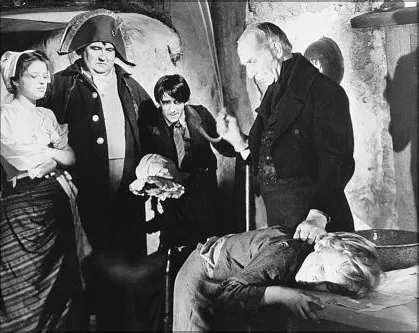
After watching Oliver Twist (1948), I became more aware of this weird phenomenon in the media, TV, movies, and music. I could watch several movies many times over just to see a particular scene with strictness or discipline. And I felt like I had to hide my newfound interest because I knew you were not supposed to like or want to experience these things. Of course, I didn't want to experience it for real, but I secretly dreamt about being "bad" in a different century and culture or as a child actor in a movie where this could have been a possibility. For example, I dreamt about playing Annie with Carol Burnett as Miss Hannigan.
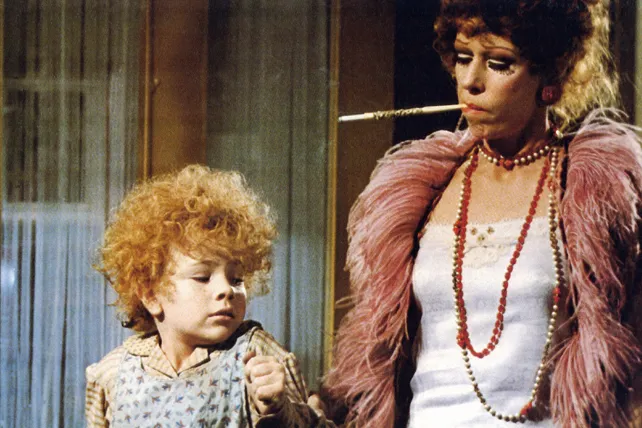
One of my favorite movies was The Sound of Music (1965), especially the scene when the von Trapp children come marching down the stairs to meet their new governess, Maria, and Brigitta, one of the children, comes walking in late reading a book. Captain von Trapp takes the book from her and gives her a light slap with the book. I secretly fantasized about Christopher Plummer, who played Captain von Trapp, as a strict father for many years. It was easy to imagine him as a father figure because he had a good heart, yet he could also be stern.
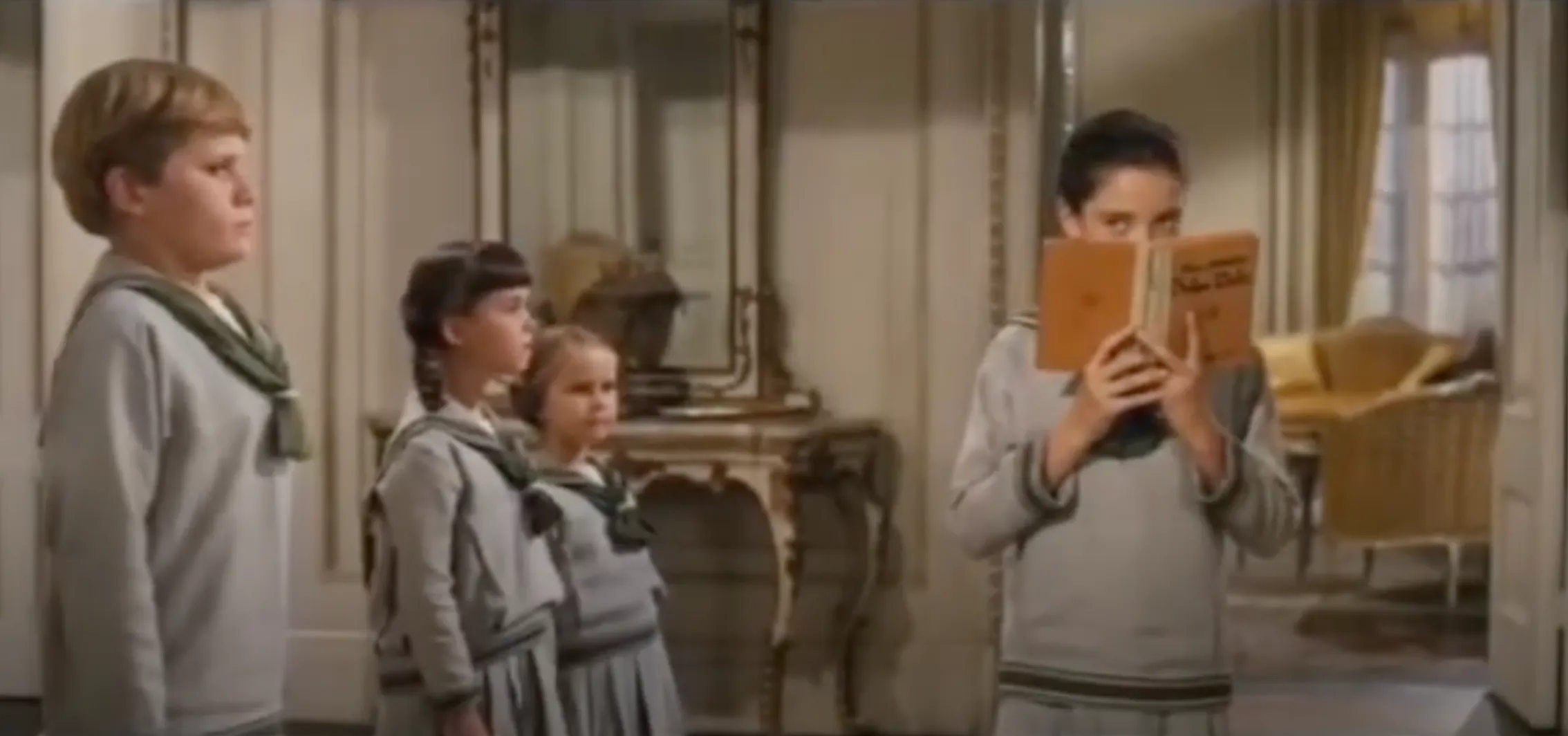
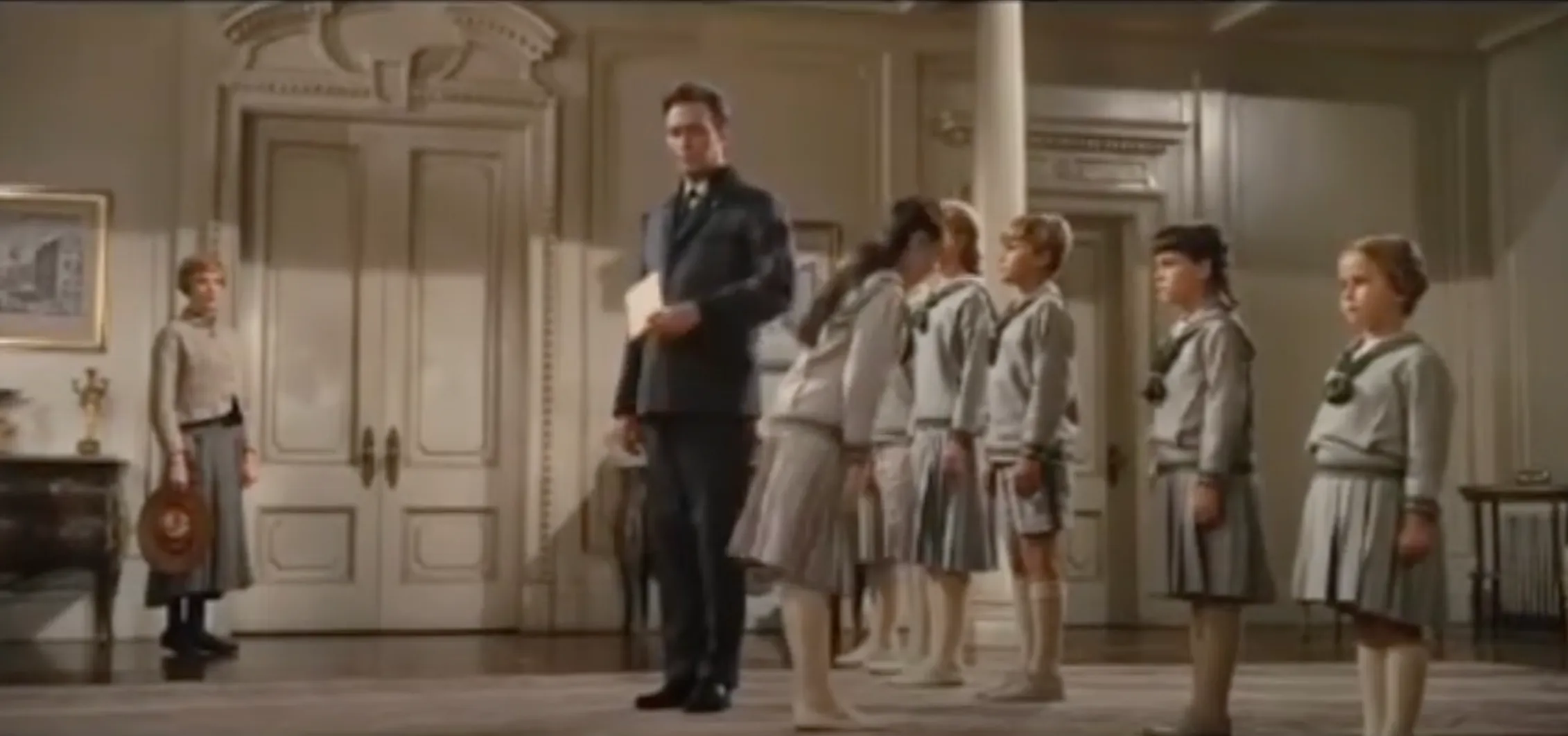
I also became interested in any movie's villains because they often had the scary qualities I was drawn towards. The villains were also more interesting as characters. The heroes were, well, boring. So, everything I watched on TV in the analog days only needed to indicate or hint at strictness or discipline, and I would dream up imaginary scenes that didn't actually appear in the movie or TV series. For example, the relationship between cruel stepmothers and their hopeful stepdaughters was intriguing. One of my favorite roles was The White Witch in The Lion, the Witch and the Wardrobe (1988). Barbara Kellerman played the role in the TV series broadcasted on BBC based on C.S. Lewis's novel The Chronicles of Narnia. She was delightfully scary, as in the opening scene below, after 55 seconds:
The more historical movies were captivating because I enjoyed seeing high and low-status roles in action, the class differences, and the hierarchy. I could easily picture myself as a maid for a Queen in any periodic drama! I loved watching how they acted and behaved and the rules in running a household, for example, who came in the back door vs. the front door. I adored the costumes, the elegance, and the attention to detail in many of these movies and series, especially the British ones. Balancing books off the top of my head, because I’d seen it in a movie, became something I had to try with my school books. Hearing someone addressed as Sir was cool because we didn't use those kinds of titles in my culture.
A scene that made a strong impression was from the periodic movie Lady Jane (1986), which I first saw several years after its official release. Helena Bonham Carter played the role of Lady Jane Grey in what must have been one of her earliest movies. The scene where she gets a beating was perhaps more formal and extreme than I'd seen before, but I was also nervously intrigued by the harshness and brutality. Since Lady Jane is based on a real story, she was a Queen in England for nine days in 1553; I tried to imagine what it must have been like to be her back then. And I started to notice a pattern in periodic movies. The earlier periods seemed more gruesome compared to more recent decades, probably because it was in real life, too.
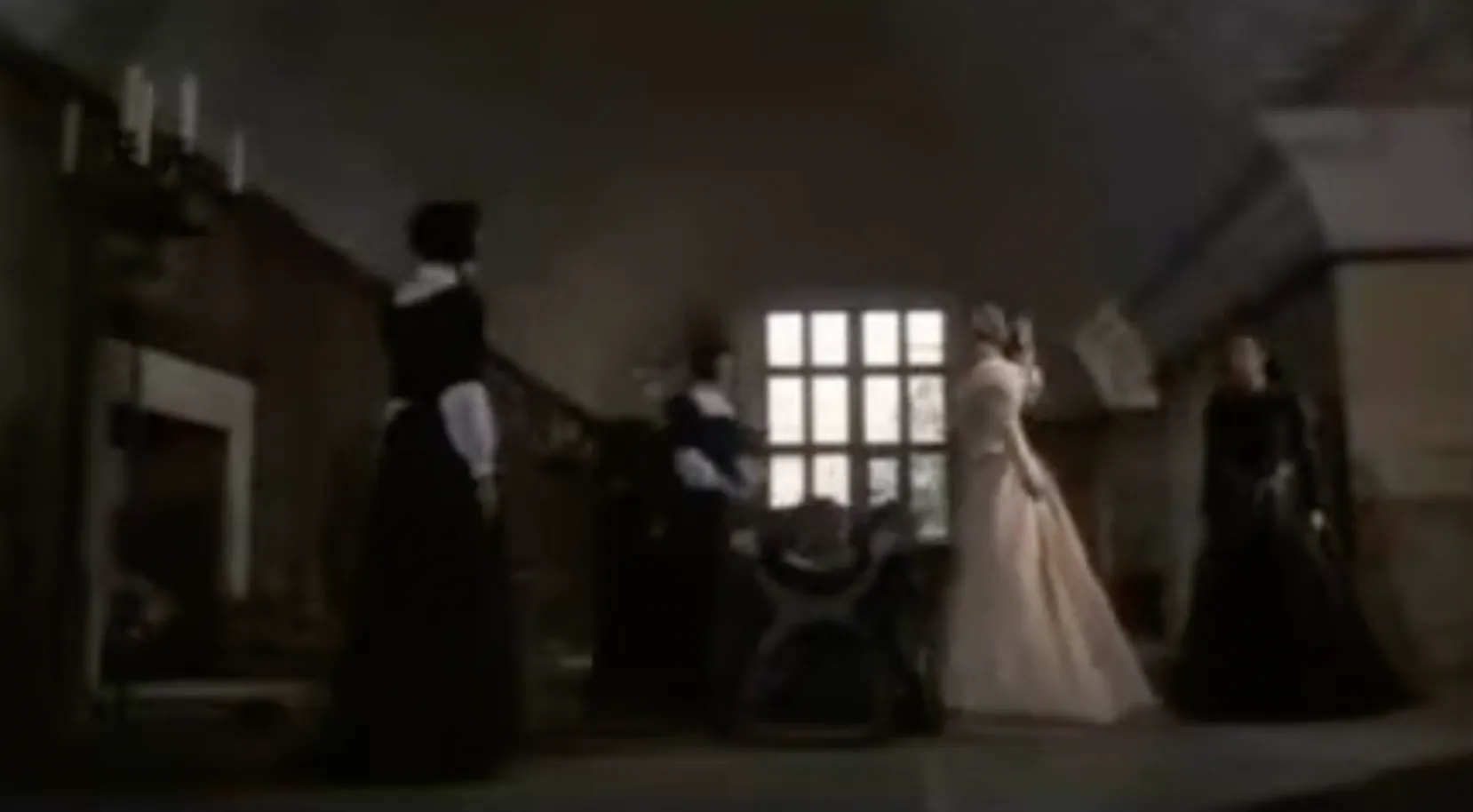

I read whatever I could find on topics such as domestic discipline and corporal punishment, and this was pre-internet, so there wasn't that much to get my hands on. In dictionaries, I would look up all the words I could associate with my strange interest to get validation that it was true and something real: discipline, punishment, spanking, time out, house arrest, detention, and other similar words. Simultaneously, I found research in magazines where experts explained with evidence that physical punishment does more harm than good, and that made total sense to me. From what I read, it seemed as if it was common in homes abroad, even in some schools overseas; it was legal to administer physical punishment at school and at home.
My favorite comic strip was The Katzenjammer Kids because the brothers Hans and Fritz always get in trouble. I liked the thought of being naughty, which was very different from how I was as a child. I could almost become jealous of one of my classmates in school because he was brave enough to do or say things in class that I would never dare. The appealing aspect was my teacher's tone and voice when he acted out. I secretly wanted to hear those words spoken to me, which, of course, never happened.
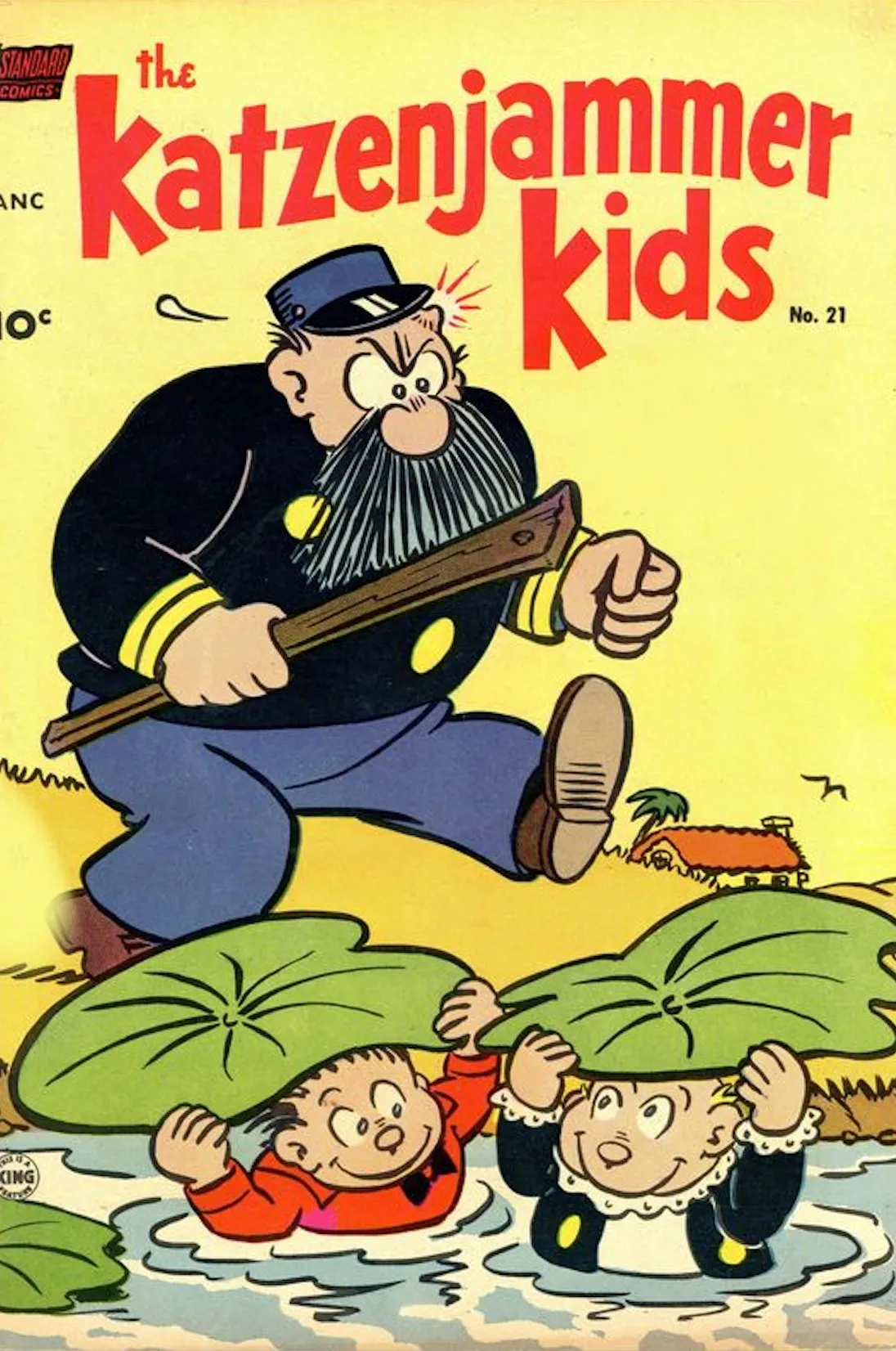
I was curious as I secretly wanted to know how it would feel like to be in situations I had seen on TV, read in books, and enjoyed in cartoons. Perhaps I was baffled by the idea of strictness and discipline because it differed from my own experience and life. While I never dreamt of strictness or discipline within my family, I did most certainly dream about a best friend's tough dad, a national politician, a principal at school, and so on. The thought of pushing boundaries and breaking the rules, misbehaving, and feeling the consequences of such behavior was as scary as it was exciting. But I was a shy child who would never attempt to do anything that was not allowed, like breaking a window at my school, which somebody actually did.
When I was 14 years old, I started to get seriously worried that I might never get to experience any of these feelings associated with disciplinary situations. Especially being punished because not only was I living in the wrong decade and culture, but I was also getting too old. After all, from what I saw, it was children who got punished as part of their upbringing.
So, I became afraid of growing up before I had the chance to experience physical punishment somewhere abroad, where it was still legal. I was also worried that I was too fat and might not be pretty enough to get it because I was not exactly a supermodel. I had no idea how I would go about finding someone who would be willing to give me such an experience. It was not like I could just walk up to someone on the street who looked the part and ask, "would you be so kind and spank me?" I started to write quite a bit about this in my teens, using pen and paper, but I later tore everything to pieces because of my fear of being revealed or found out. But it helped me to use words to describe what it was that was so interesting to me.
I felt extremely relieved when I accidentally came across the movie version of an old musical called Kiss Me Kate (1953). In the movie, Kate's father will not allow Bianca, Kate's younger sister, to marry before her older sister, Kate, is married. But Kate is ill-tempered, so no man wants to marry her. Petruchio, a friend of Lucentio who is one of three men who wants to marry Bianca, expresses interest in Kate. Kate, however, has no intentions of getting married, but Kate's father gives Petruchio permission to marry Kate. At one place in the movie, Petruchio sings out loud, "Kiss me, Kate," and Kate's response is to strike him across his face, and that's how Petruchio ends up spanking Kate while she angrily tries to resist.
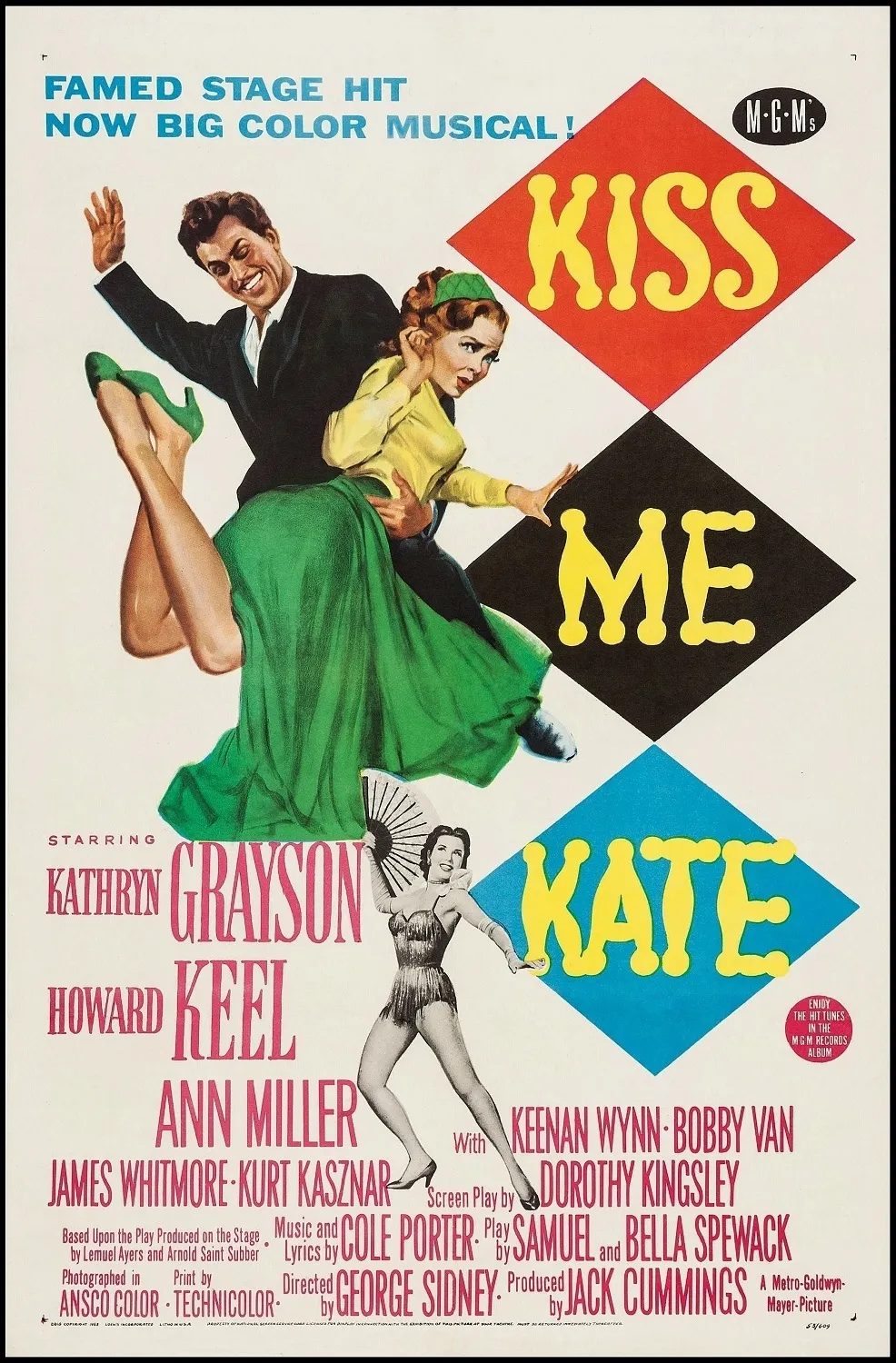
Who wants a man to treat a woman like that? It went against my core values. But I was fascinated by old-fashioned and traditional gender roles for a while. Some people with these roles believed in expressions such as "spare the rod, spoil the child," which I disagreed with but was eager to understand. I was puzzled by the kind of marriage where the man is the head of the house and the disciplinarian, and the woman helps raise the children and works in the kitchen. Anyhow, what was important for me to see in Kiss Me Kate was that I was not too old because a girlfriend or boyfriend could help me achieve at least parts of my dream. That gave me hope because if I was in a relationship, I knew I would find the courage to playfully ask for a spanking, even if I got an odd look as the first reaction, and also risked hearing no.
Madonna helped me feel less alone when I came across the song Hanky Panky in the late 90s. Spanking was expressed more as an erotic activity, but at this point, I didn't care what it was expressed as because my thoughts and feelings were normalized the more "proof" I found, which I truly needed in my teens to feel a little less different. Not proof that it existed, I had plenty of that by now, but proof that I wasn’t the only girl on the planet who had this interest. So, I didn't mind all the ooh! and yeah! in the song because it spoke to me when she sang…
Some girls, they like candy, and others, they like to grind,
I'll settle for the back of your hand somewhere on my behind.
Treat me like I'm a bad girl, even when I'm being good to you,
I don't want you to thank me, you can just spank me.
I felt the same way.
In the early 2000s, sadomasochism was on its way to becoming mainstream and not just represented through a serial killer in some crime series. I remember seeing Maggie Gyllenhaal and James Spader starring in The Secretary (2002). The movie explores the relationship between a dominant lawyer and his submissive secretary. The story gradually unfolds to include elements like bondage, discipline, sadism, and masochism (BDSM) that lost my interest. But the first scene with the letter where lawyer E. Edward Grey spanks his secretary Lee because of a typo she wrote in a letter is priceless. I've probably seen it a hundred times because of the many details in that particular scene. How he talks to her, how she reacts to what he tells her, the mood and atmosphere, and the whole scene is something I would have loved to experience.
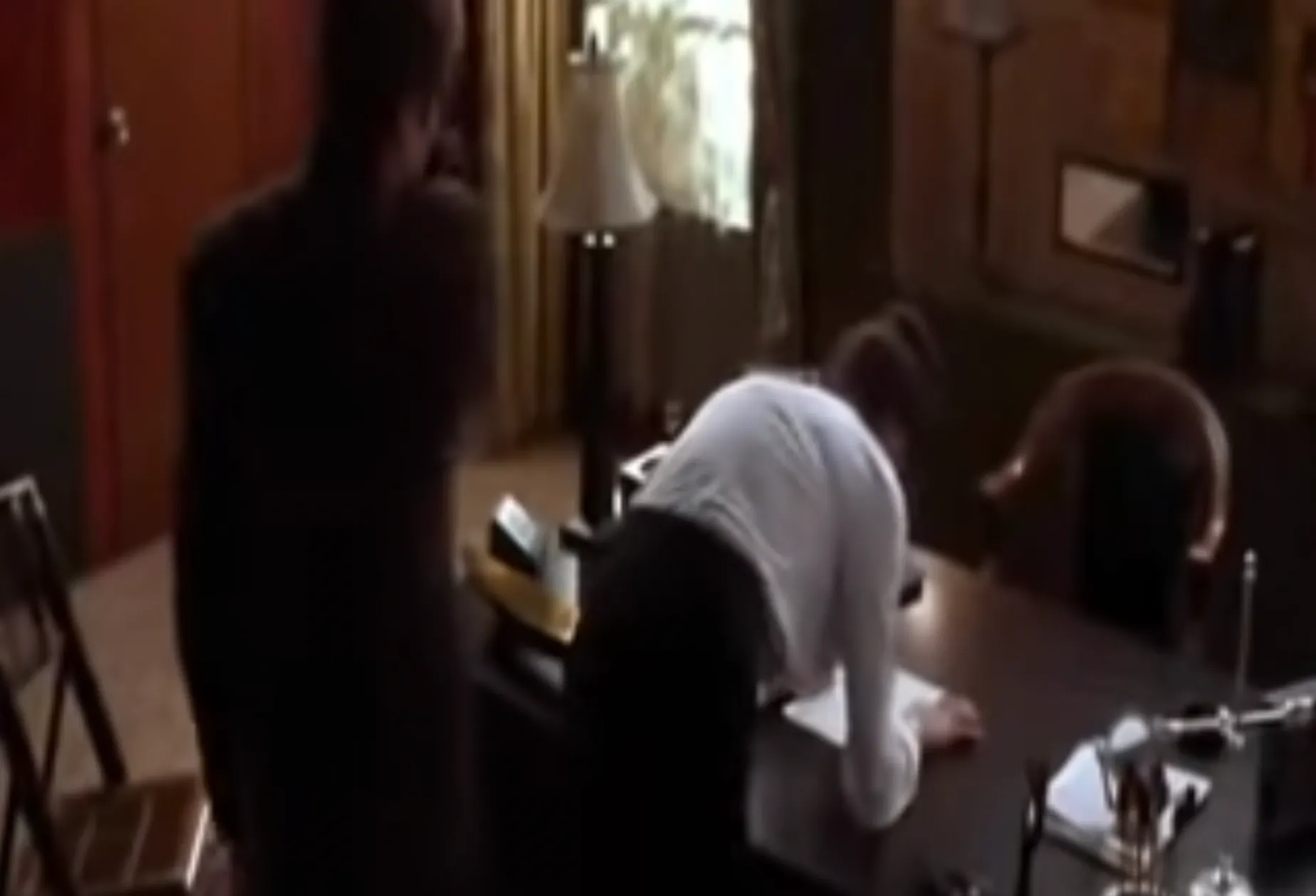
However, I didn't identify with BDSM. I didn't want this side of me, whatever it was, my interest and dream for sure, to be part of anything in an erotic context. And that became my biggest problem and challenge as a young woman because most people who are interested in anything strict and discipline-related like it as part of sex or as something that leads to sex.
Of course, I understood that certain aspects could be considered erotic because there’s a relationship between pleasure and pain. So it made sense that some people would get turned on by spanking or being spanked, while others have enough dancing with the physical pain or roller coaster of emotions, yet others again don't know how they feel until they have tried. But spanking was not always a part of my dream, although it was, more often than not, an imagined punishment. However, the punishment was just one element, a tool, inside a big container. And it was the container itself, strictness and discipline, that were the most important to me, which is why I would have loved to attend Professor Snape's classes every day all week.

My life would have been a lot easier if this interest in strictness and discipline had developed to become my sexual orientation because I quickly discovered that, in my culture, it was in to be kinky. However, I had so many opposing feelings and thoughts concerning my interest that I decided to get help and started to see a therapist. We discussed the possibility that this interest could be part of my sexual orientation, but the thought didn’t feel right to me then and has never felt right since. Therefore, I felt like something was seriously wrong with me because I had unusual desires and "wants" that didn’t fit into that identity or category. I spent many years dealing with this struggle on my own and with healthcare professionals because I felt like an outcast and a misfit if I could not reach that conclusion for myself. More than anything, I wanted to conclude that my dream was my sexual orientation.
Because if it wasn’t my sexual orientation…
If it wasn’t my sexual preference, kinky desire, bedroom spice, whatever…
What was it then?
I don't know.
Much of my twenties was hard because I didn't understand why I wanted and dreamt about strictness and discipline so much. Maybe it didn't matter. The craving was there regardless of where it came from. There are no events in the past that I can connect this craving to that could have led to this dream, only what I've already told you that I observed in the media. I've spent countless hours trying to understand myself but looking back, it hasn’t been worth my time, and I realized this quite late. And it was a long process to get to the point where I stopped looking for explanations because, like most others in their twenties, I wanted to figure myself out.
In my early thirties, I became academically interested in related topics, such as technology, media, and power, so I decided to study for a master's abroad at The New School. I think much of our society and culture is built around punishment and reward, where we constantly move toward pleasure or pain. Social media is undoubtedly built around that concept, where getting a like or heart is a form of giving and receiving pleasure. But seeing people's success pictures is also a way to feel less accomplished, a painful reminder of where we are in our lives. I could probably argue that we are in a sadomasochistic relationship with our phones.
I spent a long time trying to give my personal interest a name that felt right to me. I decided that the most accurate were strictness and discipline. I liked those two words combined: strictness as a condition and discipline as a practice.
That's essentially what I want and search for…
And that's where you come in.
Here's what I'm looking for
Let me start by asking…
Do you want to be my friend?
Since I'm looking for someone open to going on this journey with me, friendship is vital. That's because friends care about each other, and the nature of helpful strictness and discipline requires trust, honesty, and respect. What's also important to me is that we have what I'd best describe as chemistry. But you must only be interested in friendship, not a romantic relationship.
I cherish a deep connection, not snoozing small talk, that enriches our lives in various ways. I assert that we most likely share similar values and beliefs but also come into this new friendship with diverse knowledge, experience, and skills to share. I envision our friendship filled with meaningful conversations where we contribute differently with our unique perspectives, insights, and discussions around shared interests and causes that are important to us.
Our get-togethers, online and offline, can happen frequently or less frequently, depending on where you live, our schedules, and other commitments. We'll communicate by email, phone, or video calls, and in person. We meet privately, but there could also be events, conferences, and even concerts we might want to attend. Our friendship can evolve fast or slow, but I'm not in a hurry. Finding you has proven to take time, and I've learned to be very patient, at least with this pursuit.
I'd love to start a lifelong friendship with you. Lifelong friendships are rare; friends come and go, and perhaps that will happen to us, too. I don't know. That's ok. But I think it's important that you know my intention upfront so you can have that in mind while considering if you'd like the same.
Historically (and perhaps today, too)...
In parenting, strictness involved children following rules and doing what they're told. Parents were strict for reasons considered necessary at the time: to prevent something from happening, so there was a curfew, or to make sure something happened, like doing their homework. Children's behavior reflected on their parents, so good manners and well-behaved kids were important to parents who cared about their reputation. Strictness would ultimately shape, form, and prepare children to become citizens who would fit into the industrial system.
The notion of carrot and stick was real. Discipline was a way for parents to stay in control and achieve compliance. If children did or said something wrong, broke a rule, misbehaved, or disobeyed orders, they risked getting punished. The fear of punishment and actually being punished could bring forth difficult feelings such as guilt, regret, and shame. The punishment could be several things, but the purpose of discipline and punishment was to be something children feared. And fear is a strong, intense emotion that most instinctually wants to avoid.
The biggest, most important difference between strictness and discipline in our friendship and strictness and discipline in other circumstances, similar to the one I described above, between a parent and child, is consent. Consent means that strictness and discipline is a voluntary arrangement between two adults, you and me, based on a mutual understanding of how we want to be and act together. Our friendship also differs because it's a choice for me to give you power, and it's a choice for you to accept and use that power as you see fit.
Obviously, I don't need to be punished for being late for school. Oops! I mean our dinner party. I'll never be late for that. My point is that we're adults who don't engage in this way of being together for meaningless reasons that don't make sense today. In other words, it's unnecessary to be strict and use discipline with no intention that serves little to no purpose or doesn't matter to you, me, or anyone else. My rant is to say I believe…
Strictness and discipline can intentionally be used for good as a power to drive change.
For me, it would be to use strictness and discipline to…
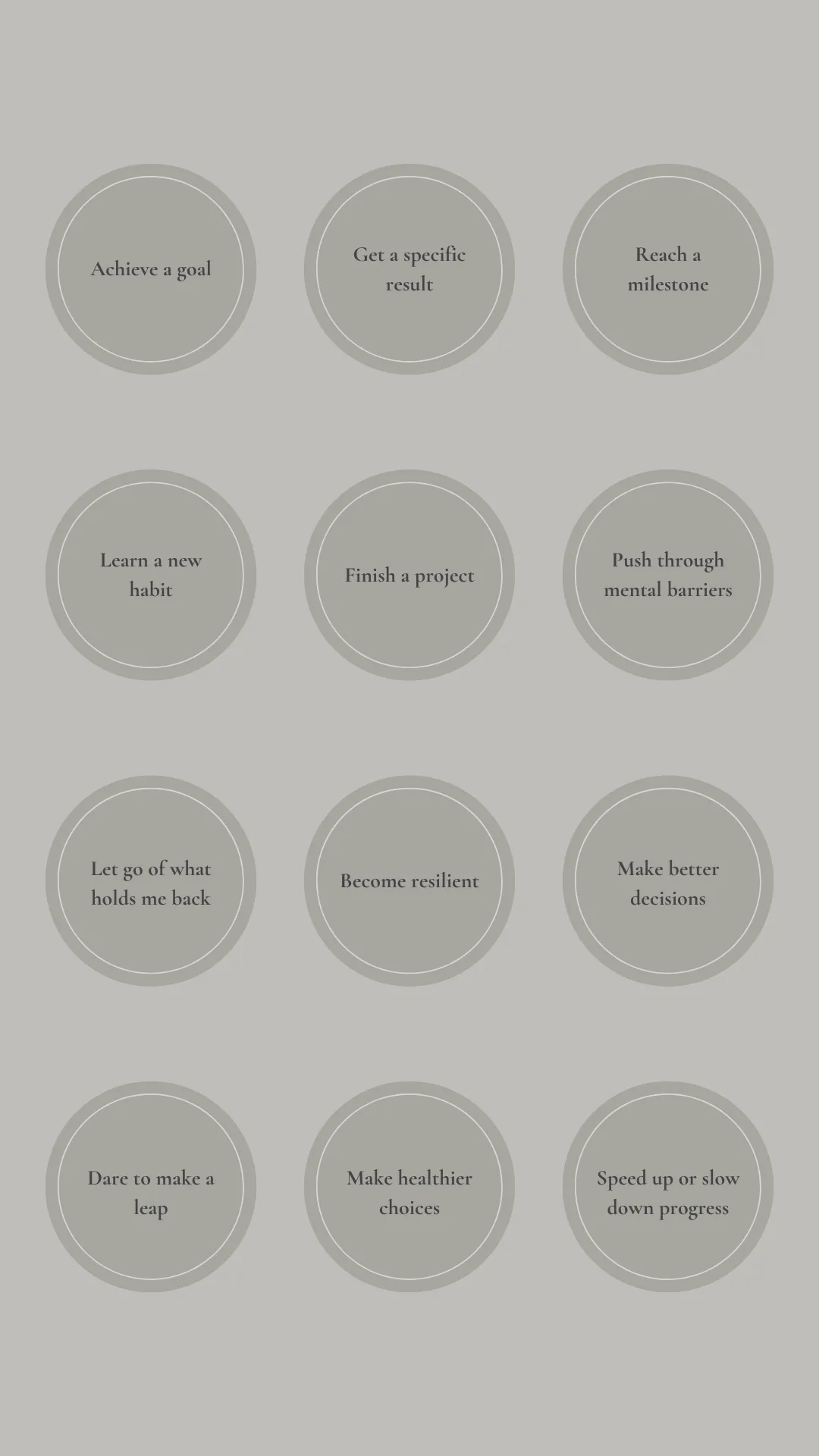
That sets the stage for a path forward
Let's first explore tension and what it means to experience strictness together. Then, I'll move on to discipline and how it might show up in our friendship. Lastly, I'll talk about punishment.
Strictness usually appears anywhere in a conversation or interaction and can happen spontaneously or be planned. You create that condition and quality through words, behaviors, postures, and gestures. There's nothing inherently wrong with being strict publicly if appropriate. I'm not going to stop you if you take me by the arm and lead me out of a room. For the most part, I prefer that what happens between us when you're strict stays between us.
When you’re strict with me, it's usually concerning something. That something can, for example, be a personal or professional project. A project you find interesting and worthy of your attention that matches my desire for your insight and guidance. You can also be strict regarding something else, like reaching a goal or developing a habit. Another approach could be to identify areas where there’s room for improvement.
I also like to think of “being strict” as a quality that can be used to hold space, which makes that condition and state far more interesting because of the possibilities that can happen there with certain constraints; what can be achieved in such space and what can be avoided, how? Strictness can involve being pushed into a corner or towards the edges, working within the constraints of what's available. So rather than being strict to avoid harm or danger, it's for possibility. And sometimes, possibilities can lead to and become opportunities.
If strictness were a switch that turns on lights, tension would add colors to those lights. The colors would light up our playing field depending on the season, month, day, and time. When strictness happens, it creates tension to varying degrees, which can be felt as a change in energy. Tension allows us to change what's happening on our playing field so we can avoid staying stuck, feeling lost, or start seeing something in a new light.
Tension can bring fear to the table, but tension is not the same as fear.
Strictness makes me feel more alert, nervous, and anxious in a good way. It can certainly make me think twice before I do or say something, but it can also catch me off guard if I don't pay attention or put my best foot forward. Therefore, strictness can be both predictable and unpredictable. You'll find a balance regarding how strict you'll be with me, and I hope you're not too strict, just enough to keep me on my toes.
You understand that a lot can change depending on the day, situation, mood – my mental space. Both internal and external forces affect us every day. That you're aware, attentive, and flexible is something I appreciate; having sensitivity is a good thing. There's no meaning in being strict if it's not called for or necessary. Ideally, it happens naturally, not forced. I don't want you to be strict just because I value that quality. You're strict because it might be worth the effort.
Being strict is a way of showing up. You can't bring that temperament without some drama or role-play. You don't need to know everything, and I don't expect that you're some kind of guru on a hill. An open mind is enough. And that you can meet me at the level I'm at on any given day.
Tension, in our context, increases like this…
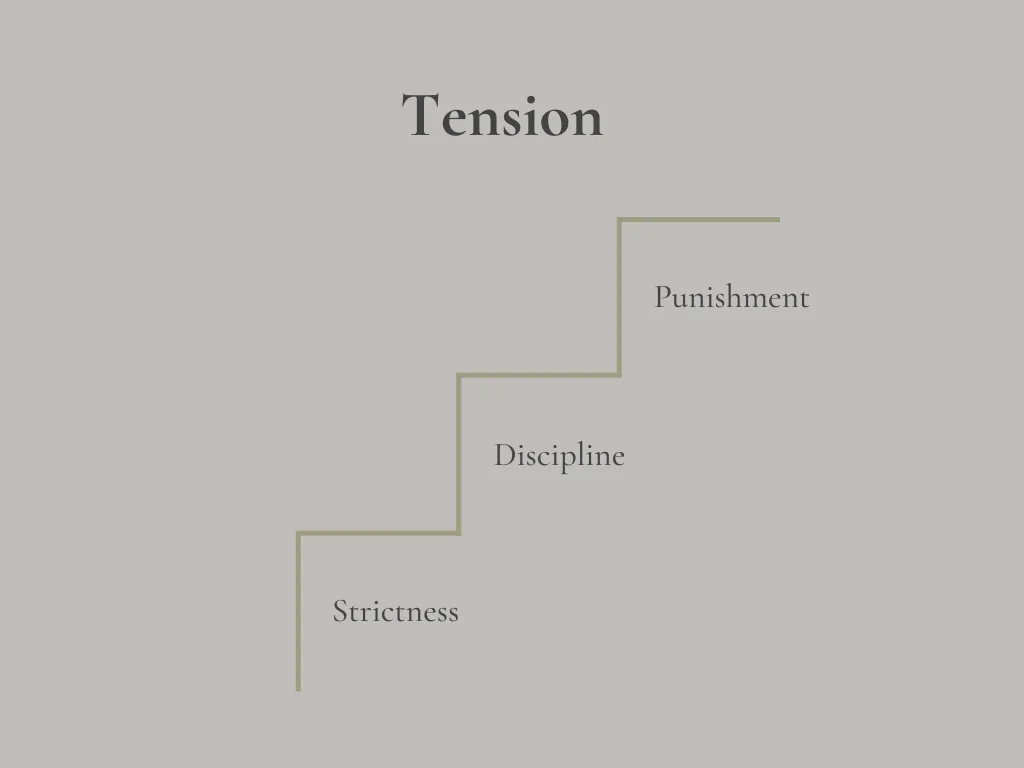
Let's continue with discipline...
First, a clarification…
When people think about disciplining someone, there's a common misconception that disciplining means punishing when it's not the same. For us, I think…
-Discipline is a skill that can be learned to control emotions, impulses, and actions. Without discipline, nothing would get done. Discipline is, therefore, something we do as it involves taking action. It can happen when we're together and when we're apart. It's not dependent on your physical presence.
-Discipline is to teach or train someone something in a controlled way. It's practiced. Discipline, therefore, depends on it being something you can teach me, show me, or share with me; it can be personal, professional, or both. It can be a learning experience.
-Discipline can happen when you're strict, but not necessarily only when you're strict. Being strict and practicing discipline can blend well together but also co-exist. One is not a prerequisite for the other.
-Discipline can involve having rules or creating our own etiquette for how we're doing things. Those rules can enforce discipline. Discipline can also be about demands, promises to be held, and deadlines. It can be formal or informal, public or private.
-Discipline can be measured. It's a way of making sure I follow the rules or am on target with something. There's no need for micro-management, but the fact that it can be measured requires me to have a practice for how I do what needs to get done.
-Discipline opens the door to vulnerability, to admit that I was wrong or mistaken, or something else that makes me think or rethink my thoughts to see if I can bend them in another direction. It's an opportunity for you to influence whatever I'm working on.
-Discipline lends itself to a simple framework: "if this, then that." Suppose certain conditions are not met or delivered as promised or up to your standards; discipline implies that there are consequences. That means there's something on the line or at stake that requires attention.
Therefore…
Discipline adds more tension and can amplify feelings.
Discipline can be like blowing up a balloon, and you reach the point where it might break, the space between knowing it could and until it actually breaks. That's where discipline "lives."
Discipline can make me apprehensive, especially if it's confrontational or direct. It can feel like being put on the spot, or perhaps caught, and even a little trapped. Physically, my heart rate increases, I can start sweating, and I breathe faster.
The tension can create an unsettling feeling that won't disappear until it's resolved.
This tension does not arise from differences of opinion but when whatever it is I have to share is not valid or correct, and you can prove me wrong or otherwise. When something does not "sit right." When it's clear that something is on me, my fault, mistake, or wrong-doing. Or when I'm off course, drifting somewhere, and need to be pulled back in.
Tension increases when discipline is a reaction or response to something I said or did not say, did or did not do. I feel it, and I know it. It can be experienced as a shift in the air. Perhaps I can compare it to watching a scary movie, the period from when you know something spooky is going to happen until it actually happens. Discipline creates suspense.
I have to admit I love the power of words.
Your ability to be eloquent, as well as the words you use to comment, make a remark, lecture, give an order, demand action, construct an argument, offer feedback, make a point of view, and even interrogate, is quite stimulating to imagine because I don't know how you'll express yourself in our situations. Yet, I'm interested in what you have to say as it forces me to listen to words I might not want to hear and be willing to attend to what's uncomfortable.
Words are not just about what you say but also about how you say it in a certain way.
Silence may be unsettling but effective. The determination in your voice, whether you whisper or speak louder or more forcefully, as well as the tone of voice you use, may have a significant impact on me as it can, for example, strengthen the meaning of what you're saying so that I understand something clearly or differently. How quickly or slowly you talk and where you pause might have an effect as well.
I also have to admit I love body language.
The way you look at me has the power to change how I feel in any given circumstance. Your presence, demeanor, and posture can influence me in different ways. For example, how you stand, sit, and move might convey assertiveness or confidence. Then there are the indicators, signals, and cues that require awareness, that we know each other well enough to pick up on those nuances and subtleties.
All communication can involve elements of play to "put on a show."
Strictness.
Discipline.
That's probably enough.
But if that's not the case…
Let's talk about punishment.
If punishment were a piece of music, it would be intense.
The thought of punishment scares me.
It's supposed to.
Discipline does not equal punishment, but discipline can lead to punishment. Hopefully, we can agree that in most other cases, punishment is not in line with our beliefs as something that works, but acknowledge that exceptions can be made because we're not "most other cases."
We can approach challenges through the lens of play.
To punish or not to punish in our friendship depends on several factors.
Here are a few guiding questions…
Is what-ever-it-is worthy of getting that attention? Is it significant enough to punish?
What will be accomplished if you punish? What effect or impact will it have?
What else have you tried? If that didn't work, could punishment help?
Ideally, punishment is the last resort. Most "things" are not worth punishing for, but it can reach a point where it's too important to ignore, so you can't not not do it. When the "cost" of not doing it is higher than if you did. Punishment can be practiced with the intention of making me feel, think, or behave differently than I was before. The only thing I hope is that the punishment feels deserved. In other words, the punishment must "fit the crime."
For us,
Punishment can be a powerful tool and a consequence that leads to something.
Used "on the way" to…
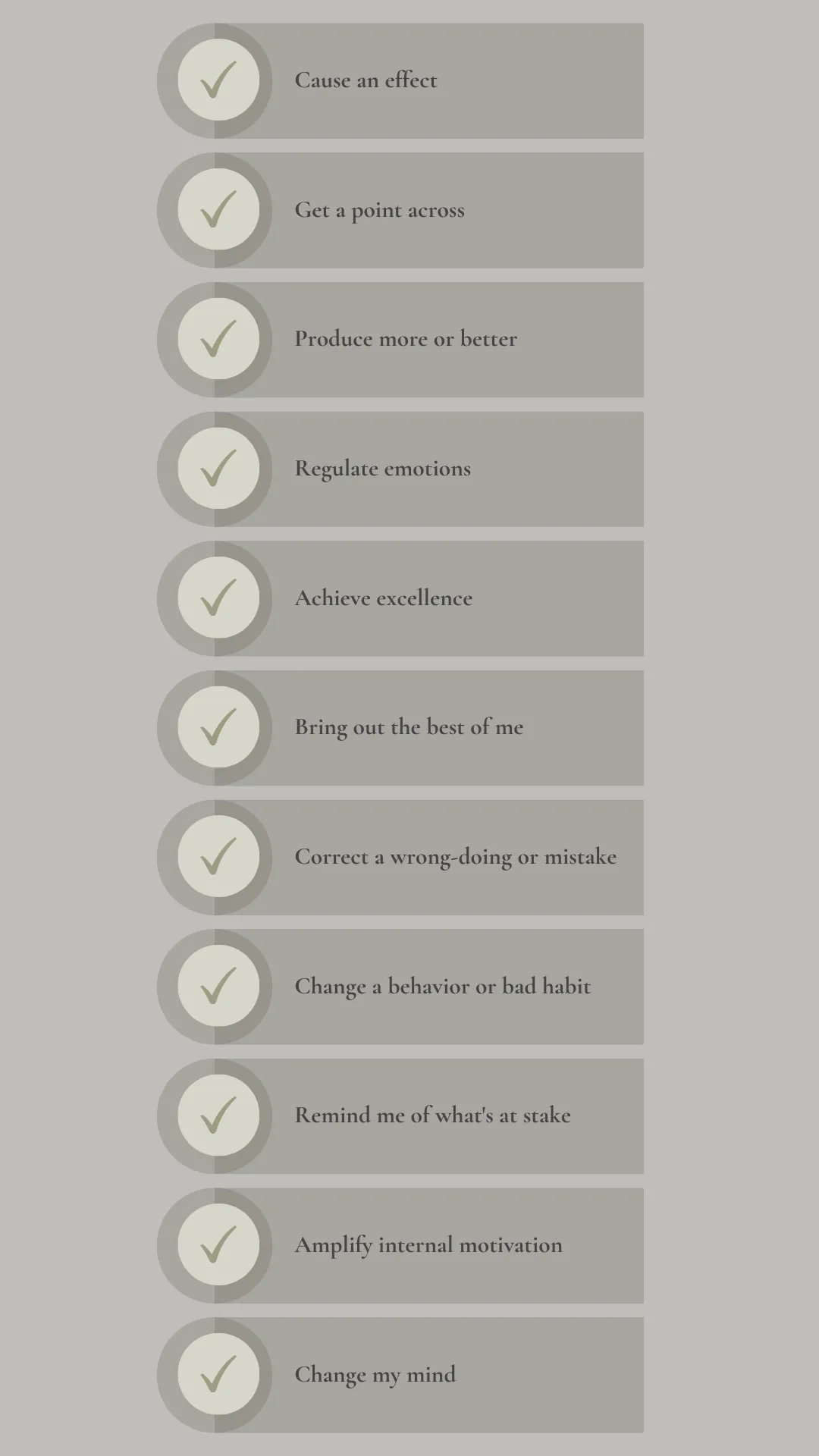
The punishment shows me that you…
-Don't give up on me that easily.
-Won't let me get away with something.
-Care enough to do it when necessary.
-Take something seriously enough.
-Think I'm worthy of that attention.
I told you earlier about what I saw in the media growing up. Many of those observations led to or were punishments. While I'm all for creative solutions, I'm not sure how creative I'd like you to be. We can discuss this if you have ideas that could fit into my open proposal. That said, I'd prefer we stick to what probably falls under old-school discipline.
Punishment causes the most tension. But it can be a slow build-up that might not go that far… It can start and stop as something else other than punishment that's part of strictness or discipline. For example, I might get…
-A warning so I can prevent punishment from happening.
-A second chance to do something I did not manage to do last time.
-An opportunity to make a case for myself that gives me the benefit of the doubt.
That would be kind of you.
What's also not a punishment but often part of that scenario…
-Grab arm, neck, ear
-A slap on the wrist, hand, shoulder
-Gestures, snap your fingers, point
-Eye contact, how you look at me
-Facial expressions, lifting eyebrows
-Postures, arms on hips, or crossed in front

I love small details like the ones mentioned above because they can be extremely impactful, with and without touch. It's often a combination of several elements working together as an orchestra playing in harmony.
Everything I've mentioned so far can be regarded as strictness, discipline, and punishment. Not all of this needs to be part of a punishment, but rather part of the discipline without punishment.
How do we know when discipline turns into punishment?
It might not be that clear.
Perhaps…
-It feels heavier.
-Certain feelings get amplified.
-There's more anticipation and/or suspense.
When disappointment turns into a consequence.
Punishment can also be implied…
Just wait until we get home.
Ouch!
Punishment can be experienced as a shift in conversation that feels a little more strenuous compared to discipline alone, and it may be a tipping point where something has built up to this moment. The punishment can be mild or severe, depending on why you’re punishing me.
The punishment can also vary in intensity, where the harshest is the most intense. It can't cause any long-term damage; safety-wise, you must not hit the tale bone as that's dangerous. For me, an impactful punishment involves some touch. The physical aspect makes the punishment more memorable and can serve as a reminder when I need or want it to be.
The psychology…
How you make me think and feel before, during, and after a punishment matters.
To talk about spanking specifically…
It's an experience that's hard to forget.
And that's, at least partly, the point.
It feels very different to be over your knees vs. bent over a couch, table, or desk. When I'm over your knees, I feel closer to you, and I, for some reason, feel little. When I bend over, the punishment becomes more formal and severe, almost cold, and feels far more serious.
Using your hand, a wooden spoon, or a hairbrush when I'm over your knees is also very different from using a paddle, belt, or cane when I'm bent over something. The mildest spanking is given by using your flat hand, while a cane is among the most severe implements you can use that require some technique to administer. But it also depends on how hard you spank, the rhythm and pace, whether it's slow or fast, and if it's a short or long-lasting event.
It also makes a massive difference if the spanking is performed outside my jeans, over my panties, or worse, directly on my skin. It differs in two ways: the first is that it feels physically different to the body, and the second is about modesty and the unpleasant exposure of some nudity during a punishment. I trust you to be considerate in making that decision.
Precision and aiming for the right area on and around the sitting bones matter a lot. If spanking is a severe punishment, I might cry. If I do, the best thing for me would be that you continue and don't stop. I'll sense reluctance and don't want you to feel sorry for me.
Finally, I don't want to decide any of this. It's up to you to spank or not to spank.
Not knowing is part of the thrill.
But rest assured…
-I would never provoke or try to create a situation to get punished.
-I promise to do my best to avoid punishment of any kind.
Otherwise, I'll faint of embarrassment. My face will turn as red as a tomato, and I could have a panic attack where I'm desperately looking for an exit sign. To show myself in this way requires quite a lot, as I'm sure you can imagine. This brings me to my only proposal to you…
To keep the possibility regarding punishment open.
It's to know that punishment is a possibility – not that it actually happens – I want most.
And there's no need to make this complicated.
Most of all…
I want something
that just
is.
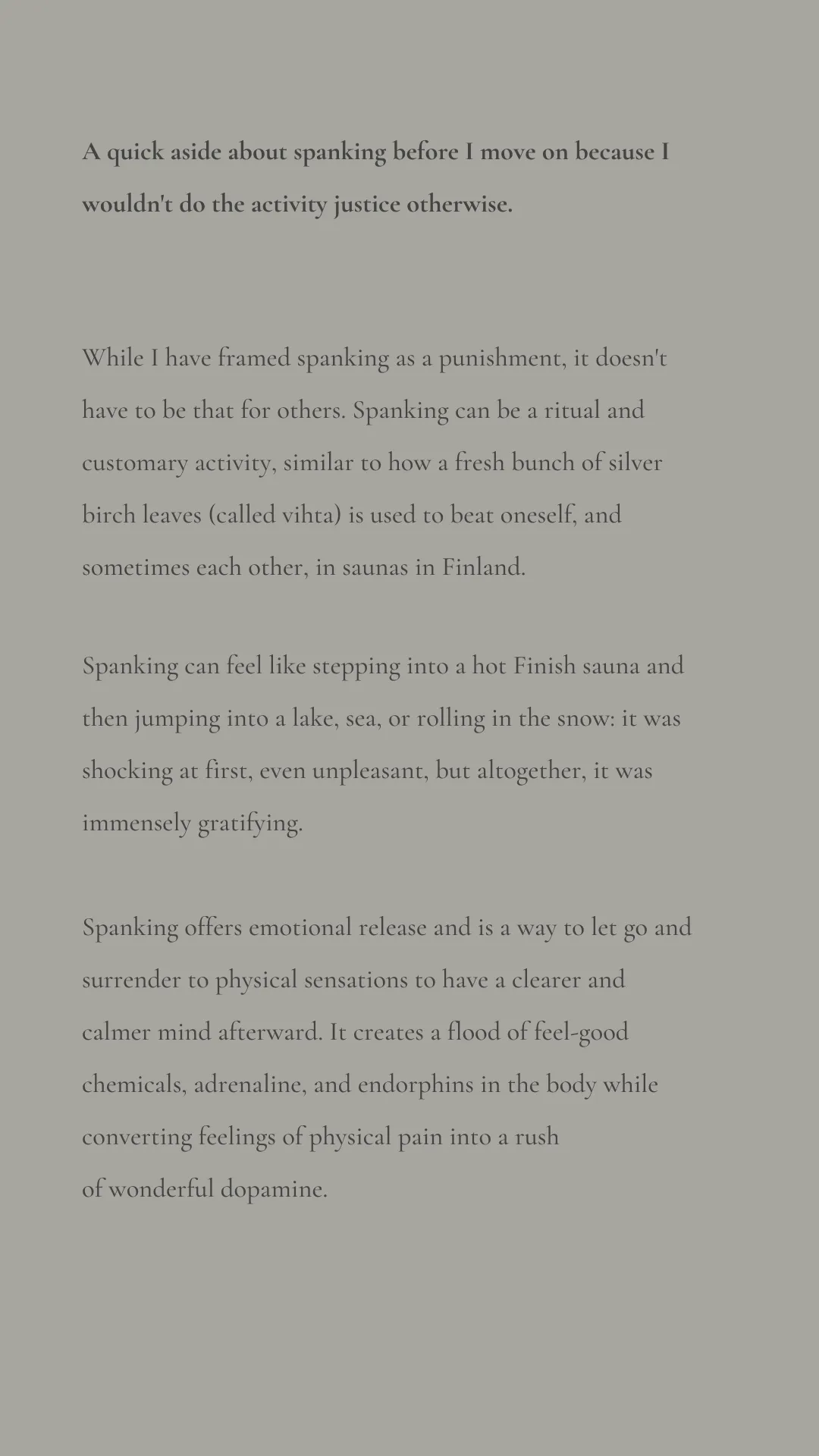
An example
I thought it could be useful to paint a picture of an imaginary situation so you can get a rough idea of how strictness, discipline, and punishment can look like when we're together. It's a little lofty because it's hard to be more specific until I know you better, but here we go…
At Your Home Office
We were at your house. It had been nine months since I saw you, and you wanted to hear about my newest project. I felt behind. More than I'd like to admit. I was excited to see you, but I'd also been nervous about this visit for weeks. That you would ask me specifically about this project, and I would not have any good answers or results to show...
We sat in your living room.
There was a pause.
You pointed at the floor in front of us.
And said…
"Please, go stand in front of me."
I slowly got up.
I stood in front of you.
Not sure where to look.
Or what to think.
It felt uncomfortable.
As if you could see through me.
I wanted to sink through the floor.
Disappear from the whole situation.
My palms started to get clammy.
I took a few deep breaths.
And waited.
You looked up at me.
I could feel your disappointment.
You sighed.
My head was tilted slightly forward.
I looked down.
You said…
"Look at me when I speak to you."
I think my heart jumped out of my body.
And through the roof.
Having eye contact with you in this situation felt impossible.
After a few seconds, I managed to find the courage.
To look at you.
You continued…
"I'm going to ask you a few questions about your project."
First, I was quick to answer.
Perhaps too quick.
I was so nervous.
Deep inside, I knew that I'd have to do better.
Vague answers were rarely good enough for you.
I was frustrated and mumbled things like…
"I'm ready to give up."
"I don't care anymore."
I had no good excuses.
I tried to give you an explanation.
Something you could accept.
Or at least chew on.
So we could move on.
To talk about more pleasant things.
The stuff that's going well.
But no.
You continued to ask.
I felt my mood shift.
To become my most humble self.
I respected you so much.
Pretty much anything you say is significant.
And means tremendously much to me.
So I paused to collect myself.
Perhaps I could do better.
Give you better answers.
Something juicy.
That would get me off the hook.
I knew that what I would say next was crucial.
For how this situation could develop.
I spent some seconds thinking.
Before I was ready to share.
I don't really think I felt ready.
But I wanted to be done.
So we could segue into a more pleasant day.
Lunch perhaps?
You were patiently waiting to hear my response.
As if you had all the time in the world.
My following answers were not perfect.
But I hoped for good enough.
I was sure I could faint any minute now.
Without saying the words.
I looked at you in a way as to ask…
What do you think?
And waited for you to say…
Something.
Anything.
You thoughtfully looked back at me.
As you were considering what I'd just said.
With the calmest, almost whispering voice, you said…
"Please go into my office, close the door, and wait for me."
In your office.
It felt like I was waiting forever.
At least 10 minutes.
I stood in the middle of the floor.
Facing your desk.
The door was behind me.
I was too scared to watch it.
You could come in any minute.
Then I heard you open it.
I did not dare to turn around.
To look.
I heard your steps approaching me from behind.
There was a long pause.
You said with the calmest voice…
"Please walk over to my desk, pull up your skirt, and bend forward."
I sighed.
I had to turn around.
To see you.
If there was a chance.
I could get out of this.
You snapped your fingers.
Pointed towards the desk.
And said with a little more force:
"You heard me!"
I didn't want to make things worse.
I thought it was wise to obey.
It felt like months.
Laying here.
Waiting.
I heard you walking around the room.
As if you were picking something up.
That made me even more nervous.
Suddenly, you were in front of me.
You gave me a pillow.
How bad was this going to get?
Well, the pillow indicated pretty bad.
You walked around.
Stopped just slightly behind me.
Now, it was just to wait for the first hit.
Then it came.
You said…
"I wanted better from you."
The second smack landed.
"It's too soon to give up."
The third smack.
"I'd like you to try harder."
Then, the fourth.
And it just continued.
Slap after slap after slap.
I grabbed onto the pillow.
As if I was holding on for dear life.
I could not hide my struggle.
Then I started…
"Please."
"I'll do better."
"I promise."
"I understand."
"I'll show you better."
"Please, please, please."
You stopped.
And said…
"Did I say you could talk?"
I did not answer.
The next slap was slightly harder.
You continued.
I was not sure if I could take much more.
So I took my arm behind my back.
To prevent you from hitting me.
And to beg some more…
"Please, stop."
You stopped.
And said…
"Please remove your hand."
You took a step closer to me.
Since I didn't.
And raised your voice…
"If you resist, it will become worse for you."
I reluctantly removed my arm.
You continued.
Occasionally, you said…
"Be quiet."
"Lay still."
"Silence!"
Thank goodness for that.
And for the pillow.
I'm a screamer.
I could wake up the whole neighborhood.
Without it.
We got into a rhythm.
I could catch my breath.
Between each stroke.
I was grateful for that.
That we danced together.
I was able to give in.
Go with the flow.
Breath.
After what felt like the last stroke.
Came a long pause.
Before you spoke…
"You can get up now."
I got up.
Turned around.
And we faced each other.
I looked down at the floor.
You lifted my chin.
So I had to look at you.
And said…
"Will you show me a better result next time?"
I humbly said…
"Yes, I promise I will."
Your comment...
"Excellent."
And I gratefully said…
"Thank you."
And hugged you.
That felt good.
You said…
"You're welcome."
And continued…
"Are you thirsty?"
I smiled…
"Yes, please!"
You smiled back…
"Let's go to the kitchen and find something to drink."
Why be strict with me?
Let's address the elephant first…
I could manage without this type of strictness and discipline.
It's not a need.
It's a want.
Although I sometimes wonder.
It's also a desire, a craving, a motivator, a wish, and a dream.
This want is my biggest secret.
Because it's private and personal.
It makes me feel vulnerable.
To share with someone.
Even you.
Also,
I can be strict with myself and practice self-discipline. That's far more important than finding a friend who can be strict and practice discipline with me. I need self-discipline, but I want to be disciplined. I'd be curious to discover if self-discipline and being disciplined by you work better together, as I'm pondering it might. It’s an interesting social experiment because…
Self-discipline is hard.
I have some, of course, but…
I'm not as self-disciplined as I'd like to be.
The thought of being disciplined by you motivates me to be better at practicing self-discipline.
What more might you want to know about me…
There’s an internal dialog that's happening between me and myself. While I spend considerable time engaging in this inner dialog, I simultaneously thought I'd be further along by now. In a world where everyone seems to know where they're going, or at least they're going, I'm a master at finding reasons and excuses and overcomplicating, which makes doing anything extremely difficult. So complex that it reaches a point where I think it's better to give up, step away, and do nothing. That way, I can continue wasting my life because it's now too hard to do anything more meaningful. But at least I recognize that my self-talk is a waste of time.
I love thinking inside my bubble, where there are plenty of ideas to work with but less follow-through. Here, I can overthink complex problems, creative dreams, and a lot of nonsense. Sometimes, I get too close to my thoughts, so it's almost impossible to see where they might lead me. That means I can think about something for days, weeks, months, and even years and still not drive those thoughts closer to making anything. Then comes the times when I lack focus and concentration. I can sit and watch the lake outside my window for hours, doing absolutely nothing except breathing. Waiting for inspiration to strike, even though I know it won't.
It's not like I don't know what to do or that I lack something others don't, but I don't feel prepared enough. This is why I take plenty of notes and write in my journal that's my work in progress. I read more than most and attend all the webinars, courses, and workshops. If there’s such a thing as overlearning, I'm definitively doing that. At the end of the day, I think it's better to let others do whatever they do so that I can step back, enjoy their great stuff, and make sure I'm not standing in the way. Besides, I don't seek awards, fame, or glory. I couldn't care less.
The problem with stepping up to be someone is that it's difficult because I know I'll be judged. People love to judge others. I think it's unavoidable. And I'm a loner who it’s easy to point fingers at as I've always struggled to fit into society's expectations. I used to be able to pass as a so-called "normal" person. I don't think I can do that anymore because I've realized that the cost has been too high. In the expensive process, I've lost myself and struggled with my true identity because I've been so determined to please others and be the person they want me to be, someone I'm not. Part of my problem is that I want to be liked, but the reality is that there will always be those who do and those who don't. And, to me, that’s a brutal reality to live in.
When it comes to producing something, my work, I always feel as if I'm a beginner. I can't seem to move from beginner to anything else. I'm continually feeding my brain more input, not soap operas, but a lot of books, courses, programs, blogs, and other awesome stuff. There's always more to learn. And I've been struggling to turn it around and go from learning to producing because, let's face it, it's joyful to learn. If there’s a job called student, I'd be mine. But I know being in this constant learning mode is probably a way of hiding and lurking. It slows me down enormously; I produce at a snail's pace, not very fast. Then, I think I should let all my ideas and concepts marinate longer because they're not ready for daylight yet.
There’s also the possibility that I could be busy working on the wrong things. That I've made, and make, plenty of bad choices and decisions along the way. I've focused too much on pursuing mainstream work that might appeal to many instead of and at the expense of what's best for me to do that's hopefully valuable to a few. The result of my vanilla approach has been poor so far because I get bored and lose interest quickly, and I don't want to say what everybody else is saying. Why I've even tried to do that for so long is appalling to me, but the reason is that it's terrifying to put my other stuff out there. It might be too far out there.
Perhaps a minor problem, but I also have a name that's hard to pronounce and an accent that doesn't sound American or British. I fall down in value with those two things: a weird name and a terrible accent. So I'll stay quiet, under the radar, a bit longer.
Then there’s another beast to fight: perfectionism. The constant worry that I'm not good enough and that my work is not good enough. Or that it's been done before, so why bother?
And I certainly don't want to be an imposter. The thought of being exposed where everyone can see right through me and discover that I'm not qualified to do, think, say, or feel something. That, actually, I might be a fraud who’s just making everything up. How dare I?
Then there’s…
What others think.
About me.
About my work.
It's not the same, but sometimes it is.
To think about what others might think has been a roadblock my entire life. And I've spent more time thinking about what others think than actually doing the work. I've heard that it doesn't matter what other people think a million times before, but it does matter to me. I'm worried that I might be misunderstood. Worse, hated. It doesn't help that I don't like to be in the spotlight unless I have to. I prefer to stay behind the scenes. It's a challenge to be an introvert with extrovert ideas. I'm shy, but at the same time, there's nothing shy about my work.
At the end of my life…
What did I do that mattered or made a difference to someone else?
While existence has a value of its own, I don't want to find myself with grey hair if I get to be that old, sitting in my rocking chair, thinking about everything that could have been but never was. I don't want to arrive at the end of my life having regrets about everything I didn’t do.
But I'm already thinking about it—every single day.
Regrets make us human, but I hope to have as few as possible.
Anything else saddens me.
Perhaps a little lighter…
At the end of the year, what did I accomplish?
Not much.
Not enough.
But the most ingrained and deeply rooted challenge that holds me back more than anything else stems from the culture I grew up in. The Law of Jante is a social code, and way of being that’s nearly impossible to shake off because we're historically spoon-fed this law from birth.
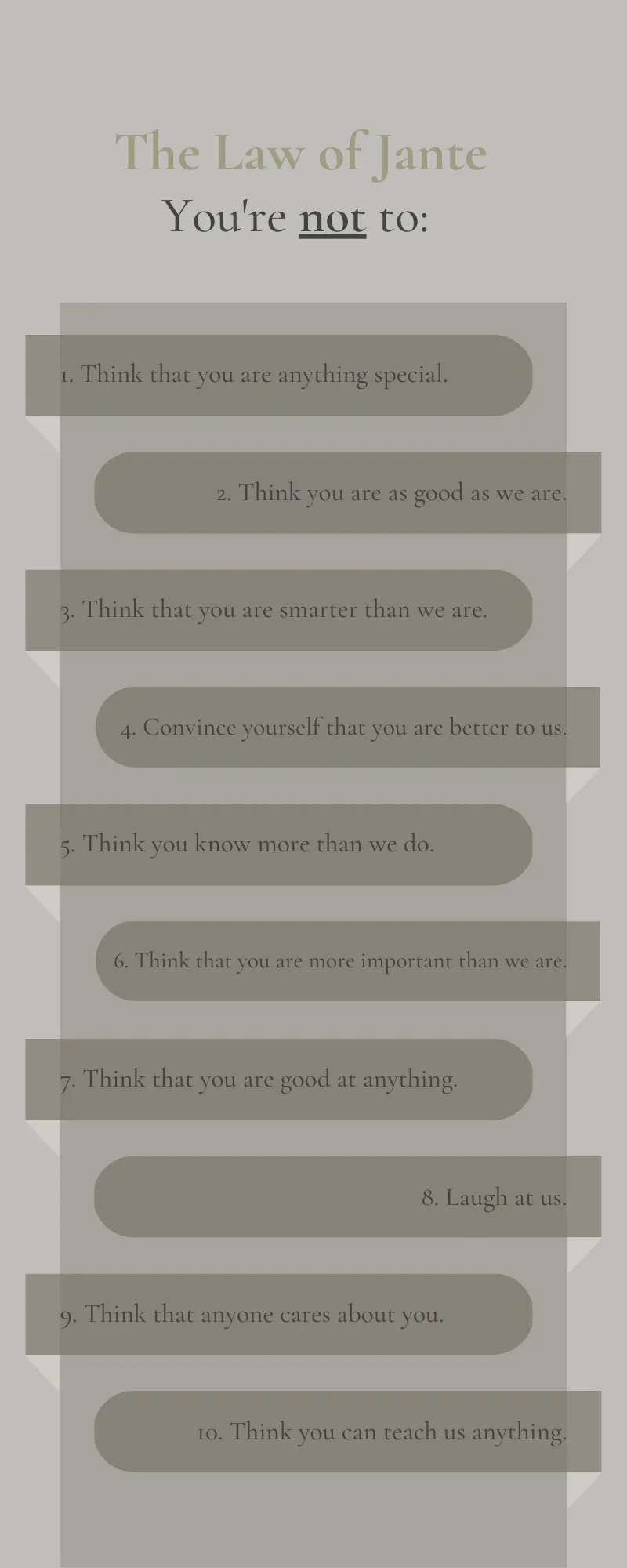
What strictness and discipline give me
I feel like I have a lot to contribute, but I'm not always able to do so successfully. I'm somewhere in there, wanting to come out, but I don't allow myself to. It feels like a version of me is trapped inside, and I can't find a way out of here, out of the negative self-talk that’s keeping me out of line. Strictness and discipline could forbid me to be my own critic and judge.
It's scary to pursue what I think is my best work. The better the idea and project seem, the scarier it becomes. The bigger the project, the harder and more frightening to work on, so I steer away from the projects that feel the scariest, which might be most important. I want to create a body of work I'm proud of, but I'm holding back because choosing something over something else is risky. Strictness and discipline could force me to make hard choices.
I do my work regardless, but it often stays with me as a precious secret never to be shared. When I've come close to sharing my most profound work, I've become terrified, and because of that fear, I run back into the closet. Every time. Unfortunately, this routine is hardwired in me after years of running around in that cycle. Strictness and discipline could break the pattern.
Your disciplinary approach to caring for me makes me joyful, not like jumping up and down excited, but in my heart and soul, I’m dancing. I can't help feeling selfish, too, but I've decided that I can live with that, knowing that over time, what strictness and discipline give me will benefit others because that's my intention. Strictness and discipline could make me happy.
The psychological release of power I experience in situations where you can be strict and we practice discipline can also be described as liberation from ego-centric behavior, compulsive thinking, and the processing of emotions. It's an opportunity to enter into a time-bound interaction where I'm free to let go and stop thinking about everything else for a while. It feels beyond wonderful to let you take over for a while and be in charge, losing myself in the moment before returning to the outside world. Strictness and discipline could offer an escape.
For me, an essential component is knowing you have control over the situation, deciding what I will hear, do, see, and feel. To give you that control also transfers my worries and psychological noise onto you while we're together. To have to answer to someone other than myself, in a situation where I’m allowed to free myself from all my inner gremlins, to give in and let go, makes me feel euphoric. Strictness and discipline could energize me greatly.
While it's delightful to get your support and encouragement, and to know that you are satisfied with me and my accomplishments, I don't need much praise, validation, or reassurance. I’ll be forever grateful to you because you’re on this not-so-ordinary path with me, where I can experience your presence, pushing me to do my best work and choose greater projects. That way, I’ll feel more confident about my progress, making decisions, taking risks, and, most importantly, taking action. Strictness and discipline could make me more efficient.
Instead of…
Hiding.
Showing.
Being distracted.
Being focused.
Doing it for me.
Doing it for you.
Let me down.
Let you down.
I say no to myself.
You say no to me.
You did not allow me to…
-Quit too soon
-Stay stuck
-Give into resistance
-Backpaddle
-Procrastinate
-Self-sabotage
-Hold back
-Stagnate
-Cut corners
You challenged me to….
-Set achievable deadlines
-Take action more often, faster
-Work with discomfort
-Expand mental capacities
-Make a commitment
-Get me back on tracks
-See a better path
-Do better next time
You did not let me get away with…
Anything.
How would you know?
It's my responsibility to keep track.
And to keep you posted.
I choose wisely.
What to share.
If you let me, I might try to talk my way out of a situation with everything I've got. But I would never deliberately cross you or be disrespectful.
Strictness, discipline, and punishment might be a form of placebo. Because I want this to work – in the way I’ve told you that it can for me – so, therefore, it does.
The thought of you bringing strictness and discipline makes me feel hopeful and optimistic.
Where do we go from here?
At this point…
I’m slightly concerned that I'm describing you as the perfect wizard who has all the answers.
It's more likely that you're a person who…
-Have and ask questions
-Sees things from another perspective
-Opens a door I've not gone through yet
-Turns on a light that gives me a realization
-Points me in a different or new direction
-Tell me what you think about my big ideas
-Calls me out on my whatever-it-is
-Keeps me on my toes
I'd be glad if we could be there for each other in different ways and follow each other's personal and professional growth. That way, we can think together and, if lucky, feed off each other and be in synchronicity.
I know you're a busy person with a lot going on, so I want to tell you that I'm not someone who grabs onto the whole hand once I get a little finger. I respect your time and your boundaries. We could meet once a year or two three times a year. We could email and speak every three months, monthly, or periodically more often if we want to.
Of course, getting to know someone takes time, and we may still have a good way to go before we're ready to embark on this journey and commit to being in this friendship that I've attempted to describe, but I'm also open to suggestions you might have for our friendship.
As good friends, when we're apart, I'll be able to feel that…
I'm able to inject you into my internal dialog.
Where I find myself working and thinking…
"What would Your Name say about this?"
And I would often know the answer.
It's possible that I can return this magic.
Who you are
-You’re a human, perhaps around my age or older. Over 40.
-You can live anywhere, but most likely in the US, Canada, the UK, or Europe.
-You have probably never been in a similar friendship like this one before.
-You approach life and work with a growth mindset and as a learning journey.
-You think better is better, but sometimes better is not the right answer.
-You’re a mindful explorer, curious and interested in what makes people tick.
-You enjoy fresh ideas, stuff that’s cutting edge or first at the forefront of "what's next."
-You seek unconventional, progressive, alternative, experimental, and/or new experiences.
-You share at least one of my interests in culture, the arts, business, entrepreneurship, social change, human rights, education, psychology, leadership, media, and creativity.
-You’re at least one step ahead of me in knowledge, experience, or something else.
-You’re multidimensional and can, therefore, see through various "lenses."
-You treat different people differently, and our friendship is that message.
Can you be strict with me?
If you can,
please write to me.
Put "strict with you" in the subject line so I know it's you.
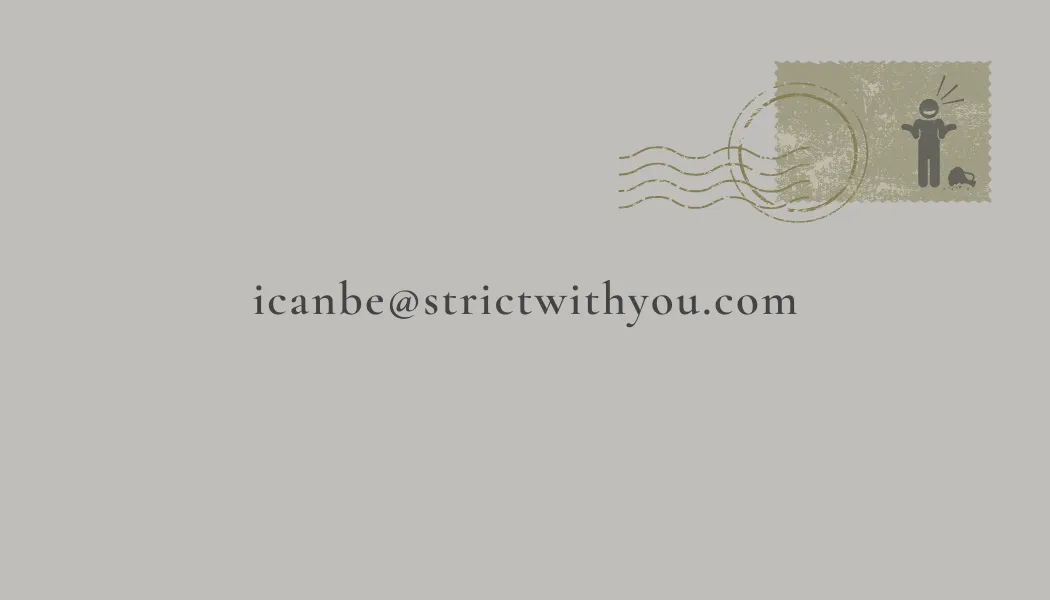
If you wish, please download the PDF version of my invitation to you.
Thank you.
PS: I only answer if I connect with what you're writing to me. I'm sorry if I don't respond to you.
Music Excerpt: Album: Stravinsky: The Firebird & Petrushka (1947 Version), The Firebird, Tableau 1: Infernal Dance of Kastchei and His Subjects Under the Firebird's Magic Spell, Performed by Philharmonia Orchestra, 2005